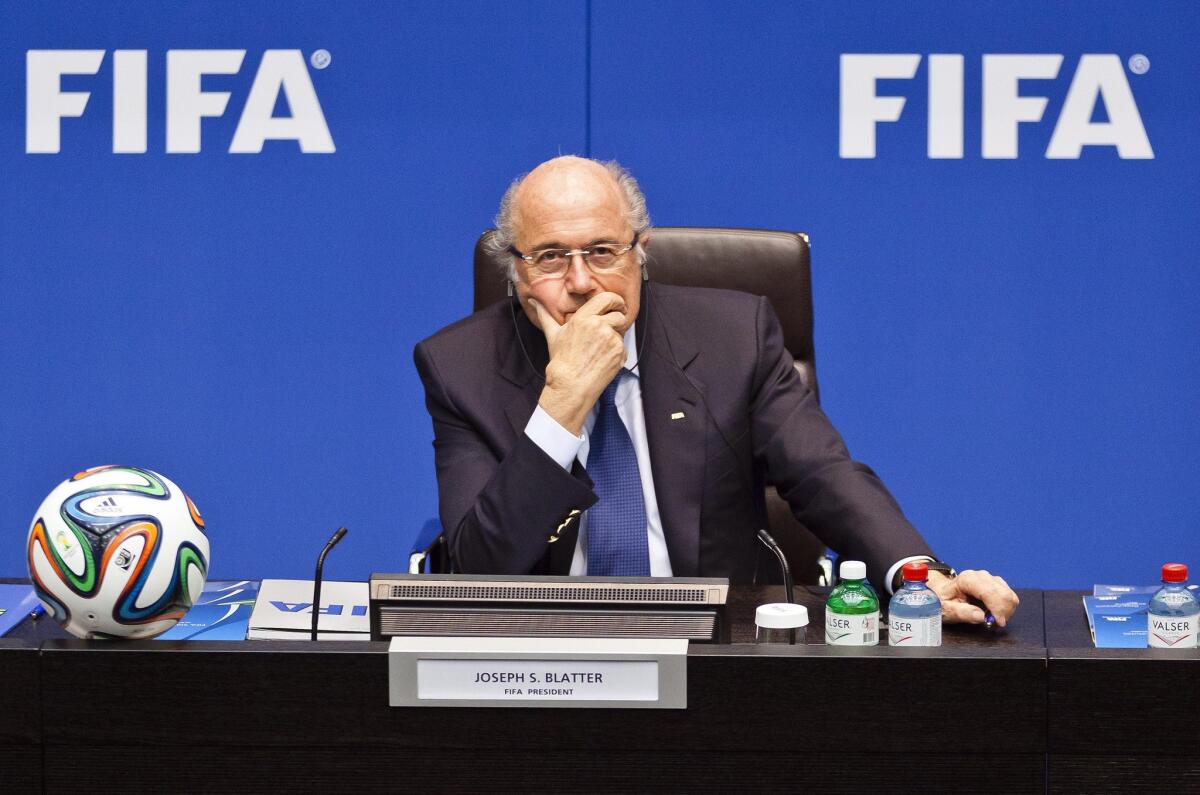FIFA sponsors appear unfazed by corruption indictments

- Share via
The FIFA corruption controversy has forced the most powerful man in soccer to relinquish his post and left several of the sport’s top officials indicted on bribery-related charges.
But the scandal doesn’t seem to be having much discernible effect on FIFA sponsors.
Federal prosecutors in New York last week indicted 14 people, including several top FIFA officials, on allegations of racketeering, money laundering and a culture of bribery. Sepp Blatter, reelected amid an uproar Friday to a fifth term as FIFA’s president, said Tuesday he would relinquish the position following a new election.
In the interim, consumer perception of the 2018 World Cup, to be held in Russia as the result of a controversial FIFA decision, sank to its lowest levels since November 2014, when Qatar was chosen to host the 2022 tournament, according to research service YouGov BrandIndex. The Qatar pick also raised a number of protests, and both selections are now in the spotlight in connection with the corruption probe.
However, perception of major sponsors such as Visa Inc., Adidas, Coca-Cola Co. and Anheuser-Busch hasn’t budged, according to YouGov’s survey of 950 people.
Many of those sponsors released statements decrying the alleged fraud, saying it tarnished the sport’s reputation. But only Visa said it would “reassess” its sponsorship unless FIFA pledged to make changes.
Companies faced increased pressure to cut ties with FIFA.
Artists upset over reports that thousands of migrant workers will suffer or die as Qatar gears up to host the tournament protested by tweaking sponsors’ logos. Three stripes became gravestones in Adidas’ logo; emaciated slaves held up the VISA logo; the golden arches for which McDonald’s is famous were replaced by two whips.
Many of the images also featured the phrase “Proudly supporting the human rights abuses of World Cup 2022.”
In a recent segment, “Last Week Tonight” host John Oliver railed against FIFA and called out sponsors as “the only people with the power to get rid of Sepp Blatter.” He begged companies to force Blatter out, promising to wear an Adidas shoe, eat from the McDonald’s dollar menu and drink Bud Light Lime from Budweiser.
On Thursday, Virgin Group founder Richard Branson wrote on his company’s website, urging FIFA sponsors to “reconsider their commitments beyond the typical statements of concern.”
“Sponsorship money has played a major role in enabling and sustaining this corrupt system for decades, it seems,” Branson wrote. “I couldn’t think of a greater risk to any brand than being described as complicit in what really looks like organised crime.”
Some have suggested that sponsors caught a lucky break when Blatter said he would resign.
Instead of being squeezed to abandon their contracts with FIFA or risk a public relations debacle, many companies will likely now offer to play a role in reforming the organization.
“Now they can be reasonably assured that changes will be made, that there will be profound restructuring,” said Chris Cakebread, a professor of advertising at Boston University. “Sponsors can feel a little better about retaining contracts.”
On Tuesday, McDonald’s said in a statement that it was “hopeful that the changes being implemented within FIFA will be a big first step in positively reforming the organization and gaining back trust from fans worldwide.”
“We respect Mr. Blatter’s decision,” Coca-Cola said in its statement. “We believe this decision will help FIFA transform itself rapidly into a much-needed 21st century structure and institution.”
Added Adidas: “Today’s news marks a step in the right direction on FIFA’s path to establish and follow transparent compliance standards in everything they do.”
It’s one thing to split from a single athlete, as many sponsors did with golfer Tiger Woods and cyclist Lance Armstrong. Even abandoning an entire team, as several companies did with the Clippers basketball team last year, isn’t rare.
But a breakup with an organization such as FIFA, which essentially has a monopoly over the world’s most popular sport, is a fraught decision.
Official sponsorships are plum positions and giving one up to make a point about principles would mean giving up lucrative access to millions of fans.
Some companies go the social media route, eschewing official sponsorships in favor of guerrilla advertising.
“But stealth marketing in the sports world is still somewhat frowned upon, though it can be very successful,” said Mark Friederich, chief operating officer of sports and entertainment research firm Navigate Research.
Still, the allure of a FIFA contract may be waning. The sports body tends to have the most leverage when negotiating deals with companies, but now experts wonder whether sponsors will be able to demand clauses that allow them to leave in cases of corruption.
“More companies are asking how they can separate themselves from the organization and instead tighten their connection to the game,” said Kenneth L. Shropshire, a professor who specializes in sports business at the Wharton School at the University of Pennsylvania. “The brand of FIFA is problematic but the game of soccer is still popular.”
And, as Friederich pointed out, fans generally aren’t too invested in the FIFA governing body.
“Nobody is a fan of FIFA, they’re a fan of soccer,” he said. “FIFA has been plagued with rumors of corruption for so many years that many fans have just come to live with it and see it as a necessary evil.”
Follow Tiffany Hsu on Twitter @tiffhsulatimes
More to Read
Go beyond the scoreboard
Get the latest on L.A.'s teams in the daily Sports Report newsletter.
You may occasionally receive promotional content from the Los Angeles Times.











